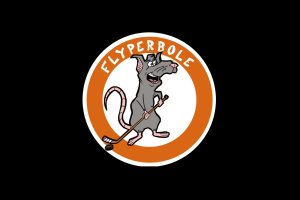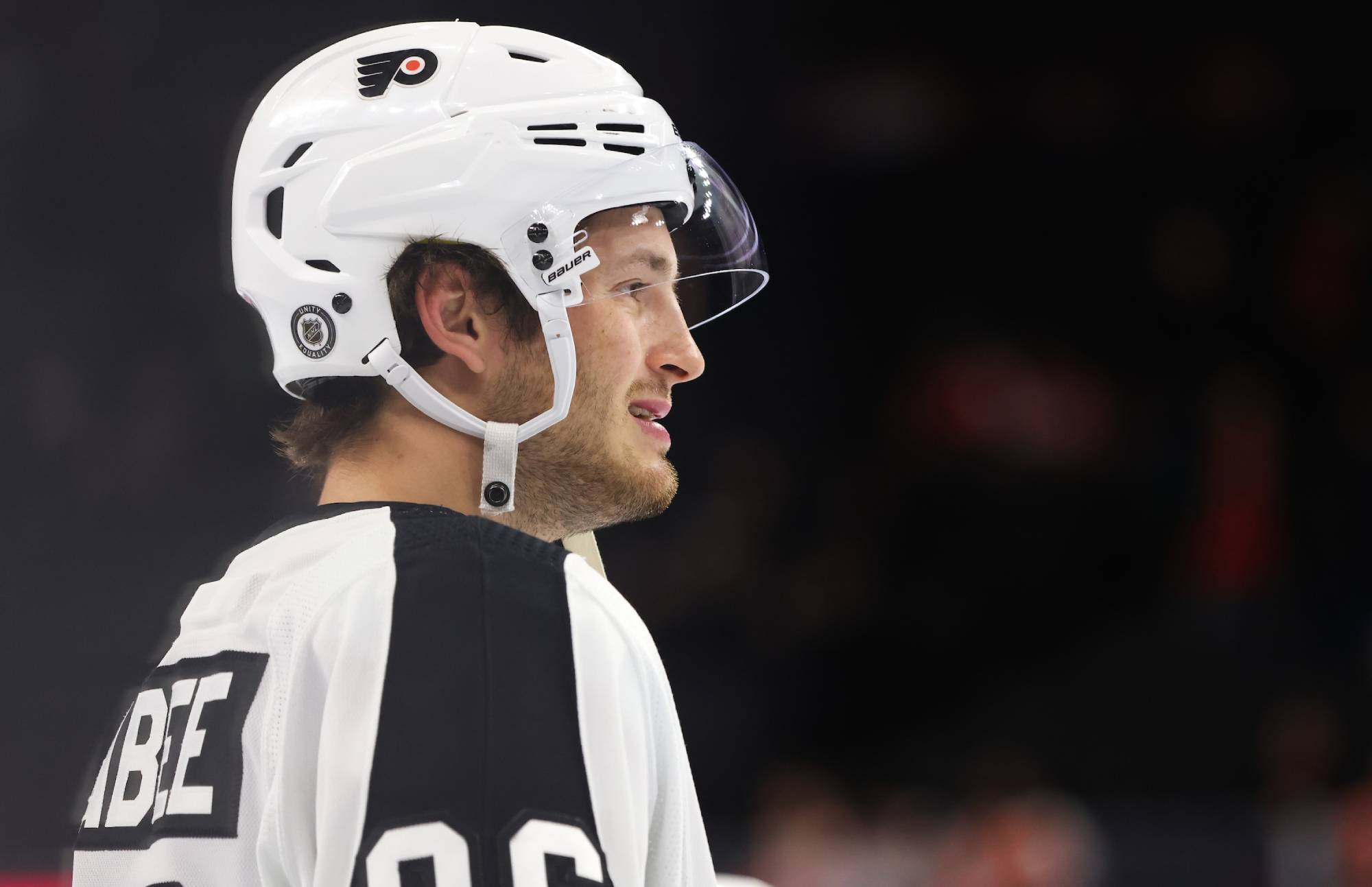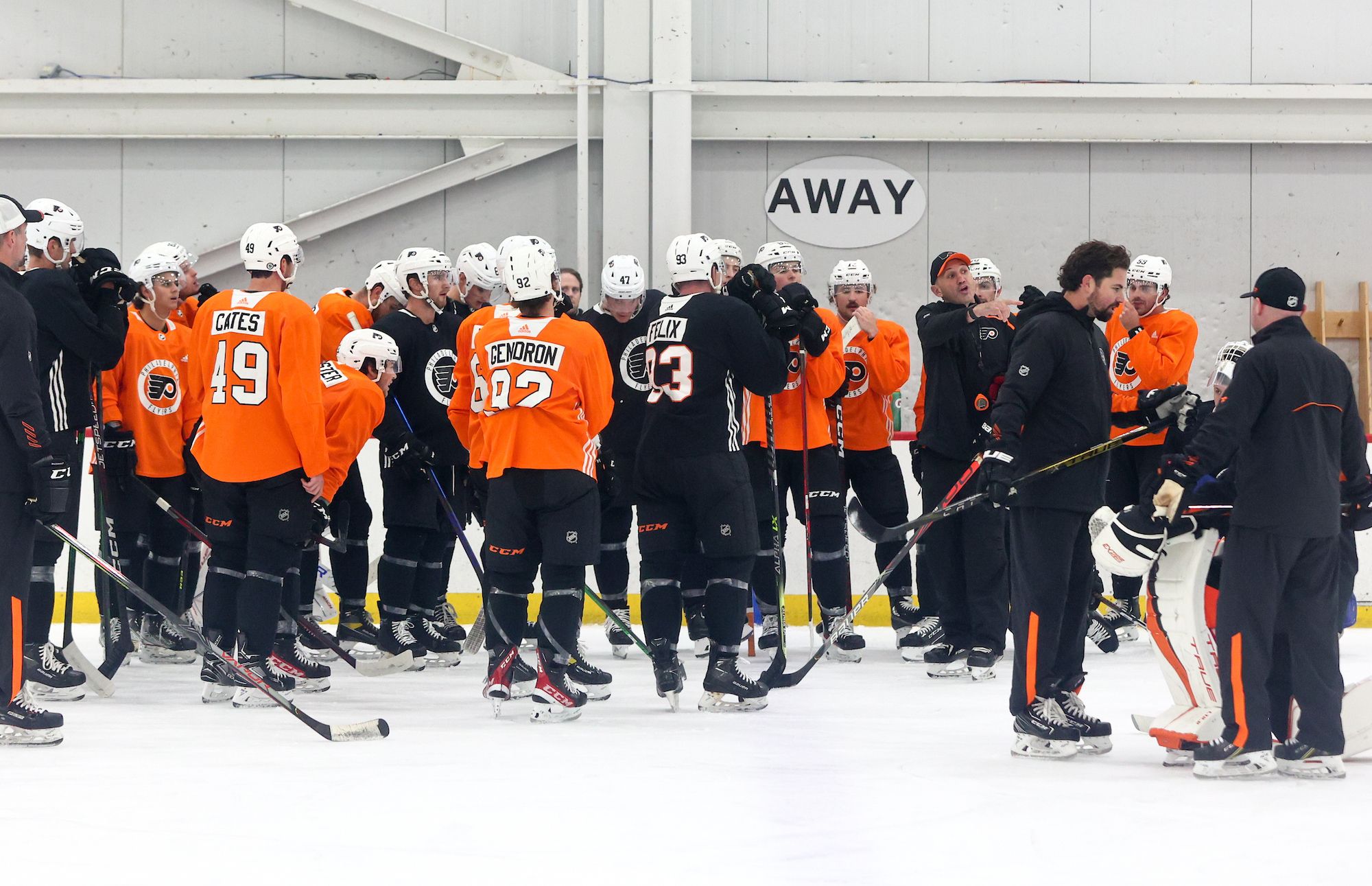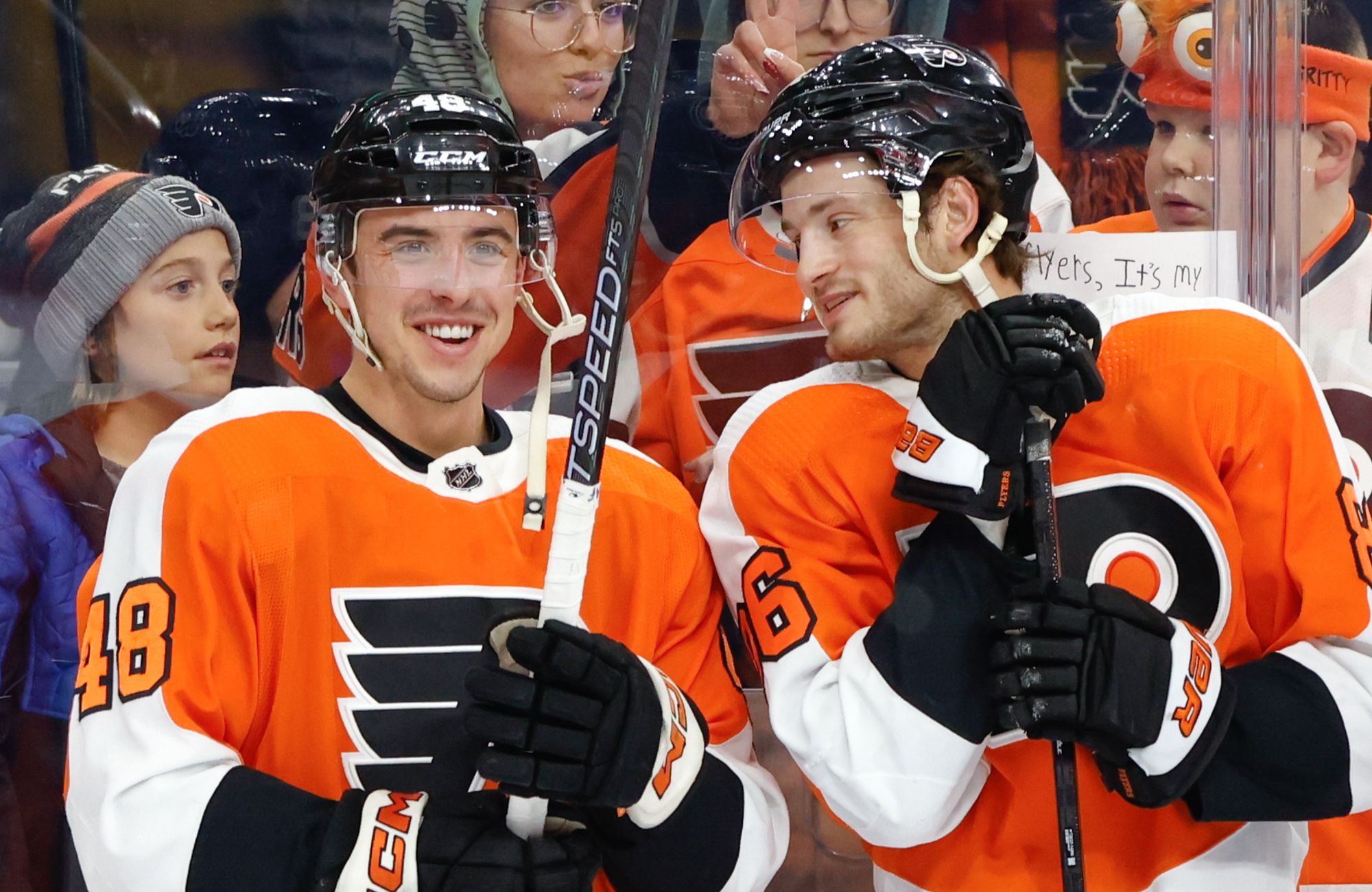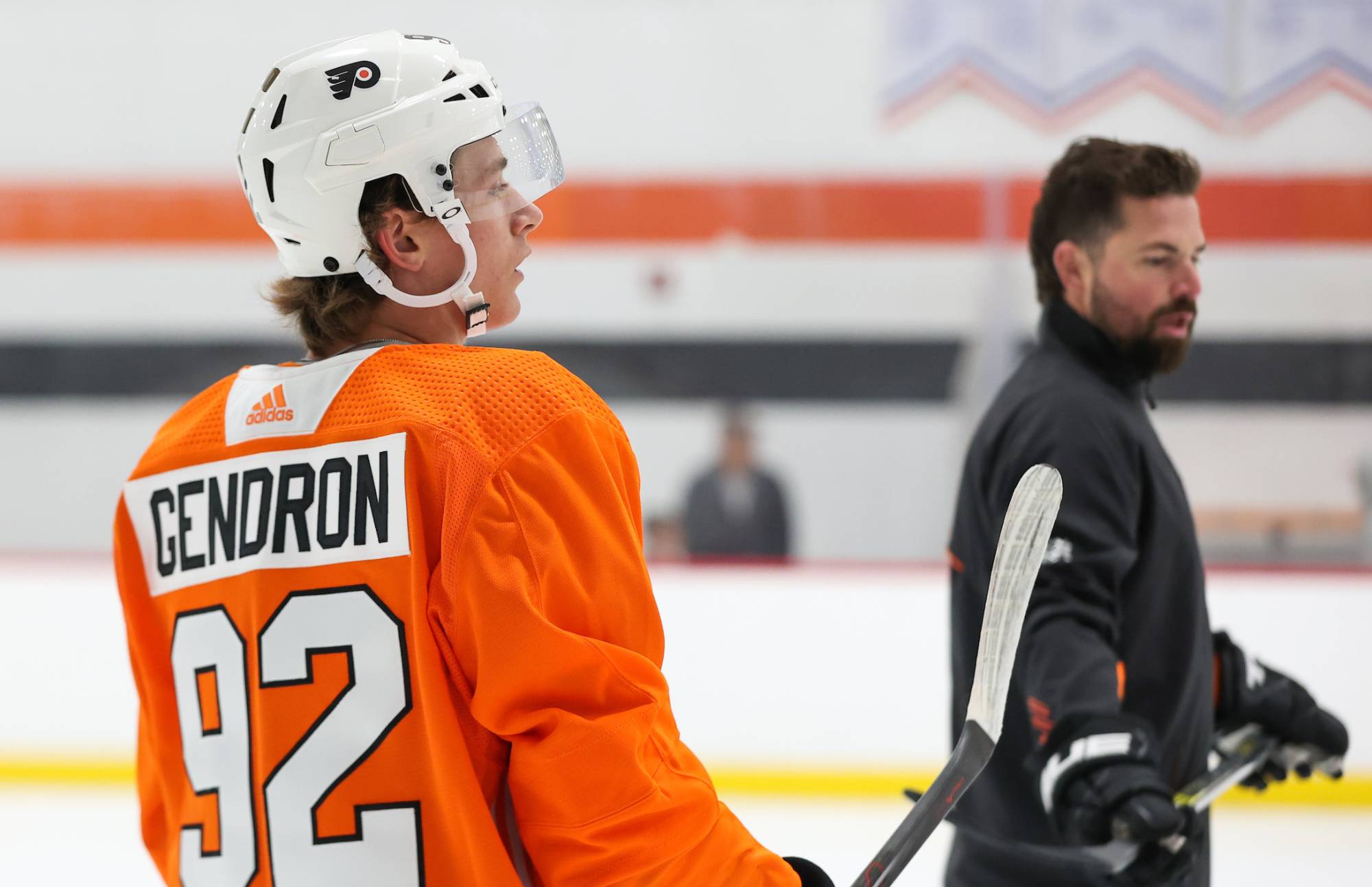Morning Observations is a new feature, where we break down the previous night’s game with an analytical eye.
- The Flyers may have earned the win last night, but let’s not ignore the fact that they could have lost this game in the first period. For the first ten minutes, Philadelphia looked like the same team that struggled so much during their west coast trip in early November. Their passes were not crisp, play in the neutral zone was passive, and the team as a whole looked indecisive in all aspects of the game. They were fortunate to be facing a Vancouver team that cannot seem to get out of its own way right now. Claude Giroux, to his credit, helped the Canucks throw their strong period away by drawing two penalties late in the first, one of which would produce the game-winning goal by Michael Raffl. The late power plays served as something of a reboot for the game – once the second period began, the Flyers’ game was far more sound, and that would continue through the final buzzer.
- Steve Mason has dealt with an endless barrage of questions from the media regarding his status as the Flyers’ presumptive “number one” goaltender. He’s held the title in name only recently, as Michal Neuvirth earned three straight starts due to his stellar play. Flyers coach Dave Hakstol gave Mason the opportunity to start last night, and the goalie took full advantage. Mason was the primary reason why the Canucks were unable to jump out to an early lead despite dominating play through most of the first period. Then, just as Vancouver began to retake control late in the second period with the help of multiple Flyers penalties, Mason delivered his best save of the night – a right handed robbery of Alexander Edler during a Canucks five-on-three. It will be curious to see if Hakstol turns back to Mason on Saturday night in a matchup against the Columbus Blue Jackets, Mason’s former club. If the coach continues to subscribe to the “hot hand” theory, Mason would be the obvious choice.
NHL.com Report | Highlights | War-On-Ice.com Report | HockeyStats.ca Report | ExpectedGoals (xG) | HockeyViz.com | BSH Recap | Meltzer’s Musings
- While the Flyers struggled to start the first period, they had no such issues in the third period while holding a one-goal lead. Dave Hakstol after the game called it “probably our best period,” and the statistics backed him up. Not only did Sean Couturier add an insurance goal late, Philadelphia was the superior team at even strength throughout the entire session. The shot attempts battle may have been tied at 13, but the Flyers generated four high-danger scoring chances while Vancouver could not create a single one. Generally, the trailing team gets the better of play in the final period, as the team with the lead sits back, cuts back on their forechecking, and focuses more on high-percentage, low-skill plays in the defensive zone. Not so last night for the Flyers. They kept the pressure on, and had the scoreboard on television been malfunctioning, viewers wouldn’t be faulted for thinking that the Flyers were the trailing team in the third period, and not the supposedly desperate Canucks.
- In their second game together, the new line of Jakub Voracek, Sean Couturier and Wayne Simmonds stood out again as the team’s best at even strength. They were rewarded with a goal late, but the line’s strong play can be traced all the way back to the first period. The trio was the only group that could get anything going while the rest of the team struggled to get out of neutral. Predictably, the line has been dominant on the cycle, as it consists of three big, skilled forwards equally adept at winning puck battles as they are at slick, high-difficulty passes. But they’re also moving with ease in transition, as well. Since the line was put together on Tuesday, Voracek has four points (one goal, three assists) and Couturier has three points (two goals, one assists). Unlocking both of their offensive games has been the real benefit for the Flyers thus far.
- There are many reasons for the new line’s success, but Voracek’s seamless transition to the left wing position cannot be overstated. I spoke with Voracek after practice on Wednesday, and he noted the change in responsibilities in switching to left wing, particularly on the breakout. He explained that the left wing often is tasked with “stretching” the defense – creating space for the other two forwards as they shoulder the load in carrying the puck up ice. Jake admitted that this runs counter to his preferences, as he loves having the puck on his stick. But on Couturier’s third period goal last night, he selflessly embraced the new responsibility and the results were immediate. Instead of carrying the puck through the neutral zone, Voracek pushed past the Vancouver defenders ahead of his linemates on the rush, forcing the Canucks to give Wayne Simmonds space to build up speed in transition. Then, Simmonds was able to dish to Voracek upon entry into the offensive zone, so that the star winger could be the primary offensive creator. Voracek may not love deferring to his teammates on the rush, but he showed last night that he can be just as effective in a support role, so long as he eventually retakes control once the blue line is gained.
- From a statistical standpoint, Claude Giroux did not have his best game. He failed to appear on the scoresheet, and finished with an uncharacteristically-low Corsi For percentage of 33.33%. But his play at the end of the first period may have turned the game. With the Flyers just regaining their footing a bit after an awful first ten minutes of the contest, Giroux drew a holding penalty on a rush through the neutral zone, sending Philadelphia to the power play, a power play that would yield the game-winning goal. But Giroux wasn’t finished. After Vancouver took yet another penalty, the captain stormed up the ice and blasted through a stationary line of Canuck penalty killers attempting to hold the blueline. In order to halt Giroux’s breakaway chance, Vancouver was forced to take yet another penalty giving Philadelphia a two-man advantage. While the Flyers did not score on the ensuing five-on-three, it was an entirely different game once the penalties concluded, as the Flyers were playing a far more crisp, controlled style of play. I imagine that extended power play time didn’t hurt the Flyers in finding their bearings.
- Philadelphia may have lost the Corsi battle at even strength, even after adjusting for score. But they definitely generated higher quality chances than the Canucks. While Vancouver was primarily kept to the outside, the Flyers peppered Markstrom with chances from the slot and right in front of the net. According to War-On-Ice.com, Philadelphia generated 17 high-danger scoring chances in all situations last night, while the Canucks could only muster six of them. Ideally, the Flyers would have played better in the neutral zone, preventing Vancouver from setting up the cycle as often as they did. But it’s tough to criticize Philadelphia’s play in the offensive and defensive zones, especially in the final forty minutes. They extracted maximum value from their attack time, and limited chances from the opposition.
- Evgeny Medvedev stood out all night long as the Flyers’ most effective defenseman. It wasn’t just the primary assist on Michael Raffl’s goal – Medvedev was a two-way force, demanding attention in the offensive zone due to his heavy point shot while also cleaning up problems in his own end. Arguably Medvedev’s biggest defensive play came midway through the third period, while the Flyers still held only a one-goal advantage. Mason made a tough save, but left a juicy rebound in the slot, where Jared McCann was lurking. Medvedev expertly kicked the puck out of the slot and right to Scott Laughton, who initiated the breakout and sent the Flyers back the other way. The Russian blueliner struggled in his own end during the first few weeks of his NHL career, but he appears to be figuring things out quickly now. And Hakstol has definitely noticed – Medvedev was on the ice for a whopping twelve defensive zone draws at even strength.
- On the negative side of the blueline, Shayne Gostisbehere had a night to forget. Breakouts are usually a key strength of his game, but Gostisbehere’s decision-making seemed a bit off last night. Once, he tried an ill-advised slap pass from behind his own net at the tail end of a shift trying to initiate the breakout, but the pass was held in the offensive zone. As a result, Ghost was forced to spend an extra twenty seconds in the defensive zone while he and his teammates tried to clear the puck. Then, in the third period, he attempted one of his preferred “right by the goalie” breakout rushes despite three Canucks blocking his path. On the former play, the puck was eventually cleared. And on the latter, Gostisbehere successfully lifted the puck to center ice. But the problem on both plays was timing. Risky slap passes around the boards can work to catch a defense off-guard, but probably aren’t the smartest decision at the end of a shift. And aggressive breakouts up the middle are usually a good risk to take for a great skating defenseman, but not when all lanes are cut off and the team is protecting a one-goal lead. Ghost just needs to be a little smarter in picking his spots.
- Luke Schenn is aiming for a return to the lineup on Saturday against the Blue Jackets, which means that one defenseman will have to exit the lineup to accommodate him. Michael Del Zotto, Evgeny Medvedev and Shayne Gostisbehere appear to be locks to stay in. Radko Gudas should be safe as well, considering his solid play alongside Del Zotto on the team’s presumptive first pairing. That leaves Nick Schultz and Brandon Manning as the most likely options for a scratch. Sitting Schultz would keep the Gostisbehere-Manning tandem together, and allow Hakstol to reunite Schenn with his former partner Medvedev without adjusting the top pairing. But Schultz has yet to see the press box this year, as Hakstol relies upon him as one of his key shutdown blueliners. That leaves Manning as the most likely candidate to sit. One positive – it could result in the reunion of the Medvedev – Gostisbehere pairing that looked so impressive back in late November against the Rangers.




